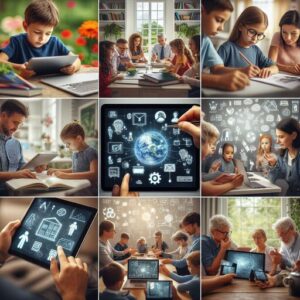In today’s digital age, the traditional concept of homework has evolved significantly, thanks to the advent of technology and the widespread availability of tablets. These versatile devices have revolutionized the way students learn, collaborate, and complete assignments outside the classroom. From accessing educational resources to collaborating with peers and receiving instant feedback, tablets play a crucial role in supporting learning beyond the confines of school walls. In this comprehensive guide, we will explore how tablets can help solve the homework dilemma by providing students with the tools they need to succeed academically, enhance their learning experiences, and achieve their educational goals.

- Access to Educational Resources: Tablets offer students convenient access to a wealth of educational resources, including digital textbooks, reference materials, online databases, and academic websites. With just a few taps on the tablet screen, students can access a vast library of information and multimedia content to support their research, study for exams, and complete assignments. Tablets provide students with anytime, anywhere access to learning materials, eliminating the barriers of time and location and enabling them to engage in self-directed learning at their own pace.
- Digital Textbooks and E-Books: Digital textbooks and e-books are increasingly replacing traditional print materials in classrooms, offering students a more interactive and engaging learning experience. Tablets allow students to download, annotate, and interact with digital textbooks and e-books, enhancing comprehension, retention, and engagement. With features such as highlighting, note-taking, and multimedia integration, students can customize their reading experience, interact with content in meaningful ways, and access additional resources to deepen their understanding of concepts.
- Interactive Learning Apps and Games: Tablets provide students with access to a wide range of interactive learning apps and games that make homework more engaging and enjoyable. Educational apps cover various subjects, including math, science, language arts, and history, offering interactive lessons, practice exercises, and quizzes to reinforce learning. From solving math problems and conducting virtual science experiments to practicing language skills and exploring historical events, students can supplement classroom instruction and master academic concepts in fun and interactive ways.
See price for Kids Tablet Bundle: Includes Amazon Fire HD 10 Kids tablet, 10.1″, | 32 GB | Sky Blue & Made for Amazon, Kids Bluetooth Headset Ages (3-7) | Purple https://amzn.to/3TNWxqi
- Collaborative Tools and Communication Platforms: Tablets enable students to collaborate with peers, communicate with teachers, and participate in group projects outside the classroom. Collaboration tools such as Google Docs, Microsoft Teams, and Zoom allow students to work together on assignments, share documents, and provide feedback in real-time. Communication platforms facilitate teacher-student interaction, allowing students to ask questions, seek clarification, and receive guidance from instructors outside of class hours. By fostering collaboration and communication, tablets promote peer learning, problem-solving, and critical thinking skills.
- Organization and Time Management: Tablets help students stay organized and manage their time effectively by providing tools for scheduling, task management, and goal setting. Calendar apps, to-do lists, and reminder notifications help students keep track of assignments, deadlines, and upcoming tests. Time management apps enable students to allocate time for studying, homework, extracurricular activities, and leisure pursuits, ensuring a balanced approach to academics and personal interests. By promoting organization and time management skills, tablets empower students to take control of their learning and achieve academic success.
- Research and Information Literacy Skills: Tablets support the development of research and information literacy skills by providing access to online resources and teaching students how to evaluate and synthesize information effectively. Search engines, online databases, and digital libraries allow students to conduct research, gather evidence, and cite sources for their assignments. Educational websites and digital archives offer a wealth of primary and secondary sources across various disciplines, enabling students to explore different perspectives, analyze data, and draw informed conclusions. By honing research and information literacy skills, tablets prepare students for academic success and lifelong learning.
See price for Contixo Kids Tablet and Heaphone Bundle – Android Kids Tablet 256GB, Includes 80+ DisneyStorybooks & Stickers (Value $350), 8GB RAM, Octa-Core Tablet Red https://amzn.to/4asvBC0
- Differentiated Instruction and Personalized Learning: Tablets facilitate differentiated instruction and personalized learning experiences that cater to individual student needs, interests, and learning styles. Educational apps and adaptive learning platforms use data analytics and artificial intelligence to assess student performance, identify learning gaps, and deliver targeted instruction and remediation. Students receive personalized recommendations, practice activities, and enrichment opportunities based on their strengths and weaknesses, allowing them to progress at their own pace and achieve mastery of academic concepts.
- Feedback and Assessment Tools: Tablets enable teachers to provide timely feedback and assessment to students on their homework assignments, projects, and assessments. Digital grading tools, rubrics, and annotation features streamline the feedback process, allowing teachers to highlight strengths, identify areas for improvement, and provide actionable suggestions for growth. Students receive immediate feedback on their work, enabling them to reflect on their performance, address misconceptions, and make revisions as needed. By facilitating feedback and assessment, tablets support student learning and academic growth.
See price for Contixo 10″ Android Kids Tablet 64GB Bundle, Includes 80+ Disney Storybooks & Stickers – Pink https://amzn.to/4a7AtN6
- Digital Citizenship and Online Safety: Tablets play a crucial role in promoting digital citizenship and online safety among students by educating them about responsible online behavior, digital literacy, and cybersecurity. Teachers and parents can use tablets to teach students about internet safety, privacy protection, and ethical use of technology. Students learn how to navigate digital environments safely, avoid online threats, and protect their personal information from phishing scams, identity theft, and cyberbullying. By promoting digital citizenship and online safety, tablets empower students to become responsible digital citizens and ethical users of technology.
In conclusion, tablets offer a wide range of benefits and opportunities for students to enhance their learning experiences, complete homework assignments, and achieve academic success beyond the classroom. By providing access to educational resources, interactive learning apps, collaborative tools, organization and time management features, research and information literacy skills, differentiated instruction, feedback and assessment tools, and promoting digital citizenship and online safety, tablets play a pivotal role in solving the homework dilemma and supporting learning in today’s digital age. As technology continues to evolve, tablets will remain valuable tools for empowering students to become lifelong learners and critical thinkers in an increasingly digital world.

